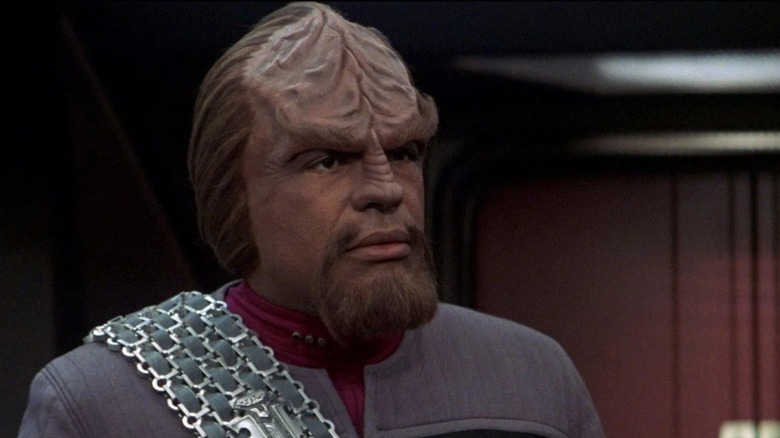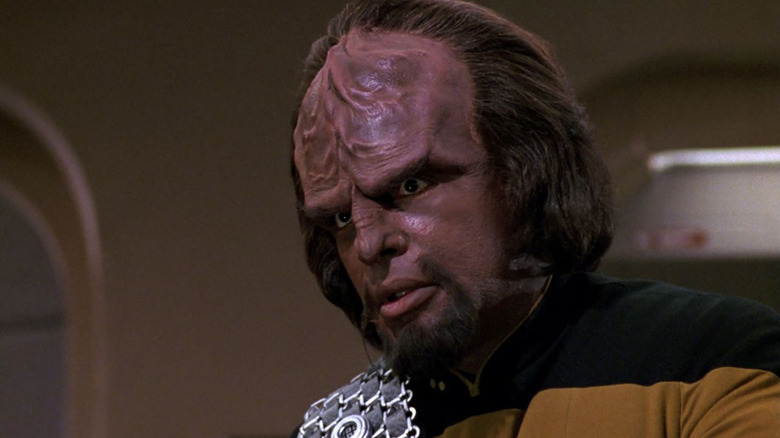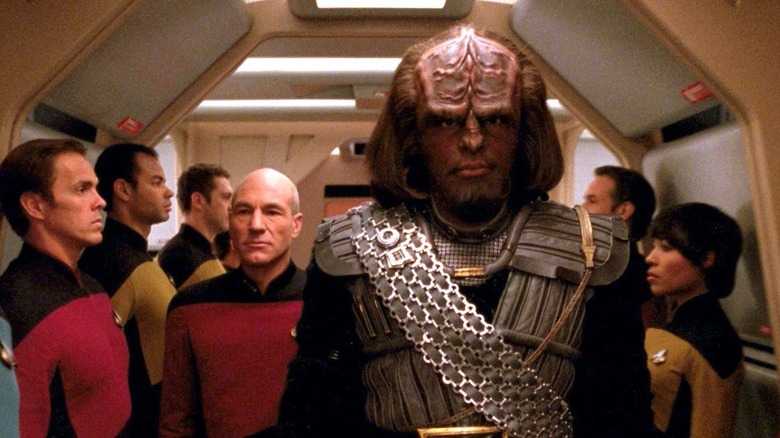Gene Roddenberry Originally Had No Interest In One Of Star Trek's Most Famous Characters
The world changed a lot in the 20 years that "Star Trek" was off-air. The Cold War was all but over when "The Next Generation" began airing in 1987, so it made sense to reimagine the Klingons, who during "The Original Series" had been the USSR stand-ins to the Federation's America. Mark A. Altman and Edward Gross' behind-the-scenes book, "The 50-Year Mission," details how the "TNG" writers did so.
David Gerrold, a writer on "TOS" who returned for "TNG," pitched a Klingon First Officer on the Enterprise-D. The parallels to Spock (Leonard Nimoy) would be obvious; producer Robert H. Justman even suggested the Klingon be half-human.
But wait, Worf wasn't the first officer on the Enterprise-D. That's because this idea was vetoed by "Trek" creator Gene Roddenberry. Roddenberry did not want to use the villains from "The Original Series" — his "TNG" production bible says Klingons and Romulans are verboten. Associate producer D.C. Fontana added that Roddenberry wasn't a fan of the "Star Trek" movies. To him, it seemed that "Roddenberry just felt that Klingons were totally black hats."
Four months later, Roddenberry approved the Klingon idea. Why? As a counter to Fontana's suggestion that there be a woman commander on the Enterprise-D. Gerrold, noting with bitter irony how misogyny had saved his idea, explained:
"Gene had been badly burned by women. He had a bitter divorce and she wanted half the money of 'Star Trek: The Next Generation.' He tends to generalize. If most of the women you meet are mean to you, you will get a feeling that all women are mean, even though it's not true. Maybe you just attract mean women."
Roddenberry wanted a young, Black actor for the part. The then-35-year-old Michael Dorn was cast and Worf was born.
Making Worf fit
Even so, the writers initially didn't know quite what to do with Worf. Producer Rick Berman noted that Dorn originally wasn't guaranteed a spot on the main cast in season 1.
Take the pilot, "Encounter At Farpoint," when the Enterprise-D separates the saucer section from the rest of the ship. Worf assumes command of the bifurcated saucer and thus doesn't encounter Q (John de Lancie) with the rest of the crew. This makes him feel like more of an ancillary character, not part of the core cast. During that initial season, Worf was overshadowed by Tasha Yar (Denise Crosby). When she dies abruptly in "Skin of Evil," Worf takes her place as Security Chief among the crew.
The writers also hadn't worked out the specifics of the Federation/Klingon relationship even into season 2. A Klingon ship brandishes the Federation insignia in "Heart of Glory" while in "Samaritan Snare," it's outright said that the Klingons have "joined the Federation." Worf's very presence on the Enterprise suggested as such, even if he was a bit of an outsider.
It's only established later that Worf is a unique case. He's a war orphan who was raised on Earth in an adoptive human family and, thus, the only Klingon in Starfleet. The Empire is a mere ally of the Federation, not a member. This was the right call; the Klingons may not be enemies of the Federation anymore, but they're still foils. Worf allowed them to explore those lingering differences, as well as how his idealized Klingon culture falls short of the reality. After all, Worf is of two worlds; he's just as much a fish out of the water on the Klingon homeworld Qo'noS as he is on the Enterprise.
Reimagining the Klingons
Interviewed in "The Fifty-Year Mission," Dorn said, "The Klingons weren't exactly evil as much as they were totally aggressive" and this was the view he took playing Worf. Indeed, "Next Generation" is when the Klingons finally grew from Roddenberry's simple "black hats" into a true culture. They're a warrior race, ruled by a feudal house system that prizes honor and the glory of battle. The Federation's egalitarian democracy is as backward to them as their culture seems to our main characters.
Thomas Doherty (a Brandeis University professor quoted in the book) compares the Klingon culture to Bushido, a moral code for the samurai of pre-modern Japan. Dorn complemented that comparison, saying the Federation-Klingon alliance mirrors America and Japan after World War 2. This reinvention was a huge success; subsequent "Star Trek" media always pull most from the "Next Generation" versions of the Klingons, even when set during the time of "The Original Series."
As for Worf himself, Dorn is the most prolific "Star Trek" actor. After "Next Generation" ended its seven-season run, he joined the cast of "Deep Space Nine" in season 4. At the time, Dorn was the only actor to have been a regular on more than one "Trek" series. He, like the rest of the "TNG" cast," returned for one last ride in "Picard" season 3. Berman had this to say:
"I feel that Michael as an actor and the character of Worf grew more than any other one of our characters or actors. It's a shoo-in character; what's more delightful than a Klingon on board the Enterprise?"
All in all, not a bad run for a character who almost didn't make it past the concept stage.


